Christianity Today Magazine
News and analysis from the world's leading Christian magazine.
News in this category: 30
Bookmark and share this category:
Subcategories
News
How groups like Hillsong learned to let go of the literal in favor of creative collaboration.
 The refrain “He is for you” doesn’t translate neatly into Spanish. In the English version of Elevation Worship’s song “The Blessing,” the phrase repeats and builds with each repetition. But in Spanish, the line is “Él te ama” or “He loves you.”“I’m glad the translators did that,” said musician and translator Sergio Villanueva, who pastors a Hispanic congregation at Wheaton Bible Church in Illinois. “To convey that idea in Spanish—‘He is for you’—you would have to use a lot more words. Spanish is a beautiful language, but we use more words and longer words.”The translation choice in “The Blessing” (“La Bendición”) reflects a growing interest among English-speaking worship artists in producing thoughtful, singable, and culturally informed translations of their music.Often, artists are intent on using translations that are as close to word-for-word as possible. But as influential songwriters and megachurches expand their reach, teams of translators are helping produce new versions of popular worship songs that are faithful to the originals without trying to replicate wording that isn’t as accessible or evocative in another language.“You have to honor the intention of the original songwriter, even if that means changing exactly what the words are saying,” said Villanueva, who has translated for Keith and Kristyn Getty, Sovereign Grace Music, and Kari Jobe.The international distribution and transl ation of English-language worship music has accelerated over the past four decades, but not consistently.In the 1980s and early ’90s, Integrity Music began releasing ...Continue reading... The refrain “He is for you” doesn’t translate neatly into Spanish. In the English version of Elevation Worship’s song “The Blessing,” the phrase repeats and builds with each repetition. But in Spanish, the line is “Él te ama” or “He loves you.”“I’m glad the translators did that,” said musician and translator Sergio Villanueva, who pastors a Hispanic congregation at Wheaton Bible Church in Illinois. “To convey that idea in Spanish—‘He is for you’—you would have to use a lot more words. Spanish is a beautiful language, but we use more words and longer words.”The translation choice in “The Blessing” (“La Bendición”) reflects a growing interest among English-speaking worship artists in producing thoughtful, singable, and culturally informed translations of their music.Often, artists are intent on using translations that are as close to word-for-word as possible. But as influential songwriters and megachurches expand their reach, teams of translators are helping produce new versions of popular worship songs that are faithful to the originals without trying to replicate wording that isn’t as accessible or evocative in another language.“You have to honor the intention of the original songwriter, even if that means changing exactly what the words are saying,” said Villanueva, who has translated for Keith and Kristyn Getty, Sovereign Grace Music, and Kari Jobe.The international distribution and transl ation of English-language worship music has accelerated over the past four decades, but not consistently.In the 1980s and early ’90s, Integrity Music began releasing ...Continue reading... |
The government plans to close its porous border with Myanmar to boost security, separating ethnic groups that straddle the boundary.
 Ngamreichan Tuithung runs a Christian boarding school that sits right at the border of India’s Manipur state and Myanmar. Amazing Grace Mission School is based in Wanglee Market, a small Indian town, and serves around 150 students from Myanmar and 6 from India.Since Myanmar’s 2021 coup, the school has become a safe haven for parents wanting to send their children away from the violence of the war raging on in Myanmar. To Tuithung, it’s an opportunity to share with students and parents “about God’s love and how God is taking care of us.”For decades, some parents in Myanmar (also known as Burma) have been able to easily send their kids to school in India, thanks to a government policy that allows citizens of either country living within 10 miles of the border to freely enter the other country without a visa. Many tribal communities share ethnic ties, familial bonds, and a way of life transcending territorial boundaries. Tuithung, who is from the Naga ethnic group, grew up in India but has many relatives in Myanmar. Because of their close ties, he can speak Burmese and visits them often.However, all this will change as the Indian government proceeds with its decision to close the international border between India and Myanmar, which shares boundaries with four Indian states: Arunachal Pradesh, Nagaland, Manipur, and Mizoram. India’s home minister Amit Shah says the action is needed to “ensure the internal security” and “to maintain the demographic structure” of northeastern India as the war in Myanmar continues. Plans include constructing a fence and implementing a surveillance system.Tuithung believes that even with tightened borders, the government will provide ...Continue reading... Ngamreichan Tuithung runs a Christian boarding school that sits right at the border of India’s Manipur state and Myanmar. Amazing Grace Mission School is based in Wanglee Market, a small Indian town, and serves around 150 students from Myanmar and 6 from India.Since Myanmar’s 2021 coup, the school has become a safe haven for parents wanting to send their children away from the violence of the war raging on in Myanmar. To Tuithung, it’s an opportunity to share with students and parents “about God’s love and how God is taking care of us.”For decades, some parents in Myanmar (also known as Burma) have been able to easily send their kids to school in India, thanks to a government policy that allows citizens of either country living within 10 miles of the border to freely enter the other country without a visa. Many tribal communities share ethnic ties, familial bonds, and a way of life transcending territorial boundaries. Tuithung, who is from the Naga ethnic group, grew up in India but has many relatives in Myanmar. Because of their close ties, he can speak Burmese and visits them often.However, all this will change as the Indian government proceeds with its decision to close the international border between India and Myanmar, which shares boundaries with four Indian states: Arunachal Pradesh, Nagaland, Manipur, and Mizoram. India’s home minister Amit Shah says the action is needed to “ensure the internal security” and “to maintain the demographic structure” of northeastern India as the war in Myanmar continues. Plans include constructing a fence and implementing a surveillance system.Tuithung believes that even with tightened borders, the government will provide ...Continue reading... |
Do activists often invest their work with religious significance? All the more reason for Christians to be discerning co-laborers.
 I love nature documentaries, especially those narrated by David Attenborough. Whether watching with my children or on my own, I love seeing the majesty of the snowy Alps or kelp forests.But I’ve noticed that in recent years, nearly every somber vignette of a species struggling on the edge of survival ends with a call to action. Viewers are beckoned to take responsibility for causing a poor animal’s plight and to consider how they can fix things before the species is gone forever.I understand the impulse to believe that animals’ struggles should move humans to action. However, it is the ethics informing the narrator’s pleas that seem a bit muddled.By many documentarians’ admission, the species we marvel at on screen have emerged out of eons of struggles to survive and adapt to their surroundings. Sometimes, the narrators even remind us that this process has resulted in countless prior species disappearing into extinction.Whether you believe in a young or an old earth, in God’s hand or in meaningless physical forces guiding history, we can all agree that change, death, and selection favoring adaptability are features of life on earth. Witnessing it in real time makes for compelling television drama, but the moral indictment that you and I contribute to grave evil when one of these species goes extinct does not seem to square with the documentarians’ worldview.What compels us to see polar bears possibly going extinct in terms of moral right and wrong? If we take human action out of the equation, isn’t history littered with the bones of countless species that have gone extinct? Are not humans and their actions part of nature?A robust theology of creation careIf we listen closely, ...Continue reading... I love nature documentaries, especially those narrated by David Attenborough. Whether watching with my children or on my own, I love seeing the majesty of the snowy Alps or kelp forests.But I’ve noticed that in recent years, nearly every somber vignette of a species struggling on the edge of survival ends with a call to action. Viewers are beckoned to take responsibility for causing a poor animal’s plight and to consider how they can fix things before the species is gone forever.I understand the impulse to believe that animals’ struggles should move humans to action. However, it is the ethics informing the narrator’s pleas that seem a bit muddled.By many documentarians’ admission, the species we marvel at on screen have emerged out of eons of struggles to survive and adapt to their surroundings. Sometimes, the narrators even remind us that this process has resulted in countless prior species disappearing into extinction.Whether you believe in a young or an old earth, in God’s hand or in meaningless physical forces guiding history, we can all agree that change, death, and selection favoring adaptability are features of life on earth. Witnessing it in real time makes for compelling television drama, but the moral indictment that you and I contribute to grave evil when one of these species goes extinct does not seem to square with the documentarians’ worldview.What compels us to see polar bears possibly going extinct in terms of moral right and wrong? If we take human action out of the equation, isn’t history littered with the bones of countless species that have gone extinct? Are not humans and their actions part of nature?A robust theology of creation careIf we listen closely, ...Continue reading... |
Let us not give up meeting together—even when we disagree.
 Recently, a woman at my church approached me with a question borne out of genuine curiosity. She asked, “You’re a female theologian. Why did you choose to come to our church when women aren’t allowed to preach here?”Since much of my work as a Bible scholar is public, it is no secret that I support women’s full participation in ministry, including in church leadership. So I wasn’t surprised that someone happened to notice my convictions did not match our church’s practice on this issue.It’s a good question, and one I’ve wrestled with regularly—since, at present, I don’t feel I’m able to serve our church in all the ways that God has called and equipped me. I so long for the body of Christ to embrace the gifts of all its members, not only here but around the world. But as CT’s April issue reminds us, the global church is far from united on what women can and can’t do in church.Still, I was glad my friend asked me about our family’s decision-making process, because it’s face-to-face conversations like this that prevent polarization. The role of women isn’t the only issue that divides us today. Approaches to racial reconciliation or diversity initiatives, our posture toward climate change, and politics—particularly when there’s another contentious presidential election in sight—are all areas that threaten to fracture our faith communities.According to The Great Dechurching, a recent book by Jim Davis, Michael Graham, and Ryan P. Burge, people are leaving the church in unprecedented numbers. Forty million Americans who used to attend church no longer do—that’s 16 percent ...Continue reading... Recently, a woman at my church approached me with a question borne out of genuine curiosity. She asked, “You’re a female theologian. Why did you choose to come to our church when women aren’t allowed to preach here?”Since much of my work as a Bible scholar is public, it is no secret that I support women’s full participation in ministry, including in church leadership. So I wasn’t surprised that someone happened to notice my convictions did not match our church’s practice on this issue.It’s a good question, and one I’ve wrestled with regularly—since, at present, I don’t feel I’m able to serve our church in all the ways that God has called and equipped me. I so long for the body of Christ to embrace the gifts of all its members, not only here but around the world. But as CT’s April issue reminds us, the global church is far from united on what women can and can’t do in church.Still, I was glad my friend asked me about our family’s decision-making process, because it’s face-to-face conversations like this that prevent polarization. The role of women isn’t the only issue that divides us today. Approaches to racial reconciliation or diversity initiatives, our posture toward climate change, and politics—particularly when there’s another contentious presidential election in sight—are all areas that threaten to fracture our faith communities.According to The Great Dechurching, a recent book by Jim Davis, Michael Graham, and Ryan P. Burge, people are leaving the church in unprecedented numbers. Forty million Americans who used to attend church no longer do—that’s 16 percent ...Continue reading... |
The rage of the mob is a poor substitute for real community.
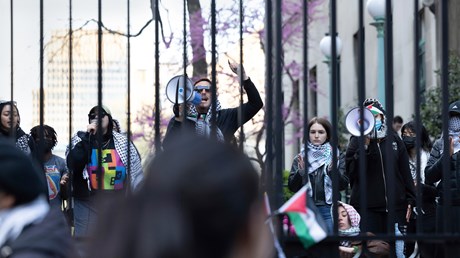 This piece was adapted from Russell Moore’s newsletter. Subscribe here.As Columbia University and other elite campuses erupt into protests against the United States’ diplomatic and military support of Israel’s war against Hamas, US Sen. John Fetterman denounced the antisemitic speech of some of these protesters, remarking on the social platform X, “Add some tiki torches and it’s Charlottesville for these Jewish students.”Whatever one thinks of Fetterman’s analogy or of the Israel-Hamas war, we would do well to listen to the common ring of the Charlottesville chant, “You will not replace us! Jews will not replace us!” with the one recorded this week on the Columbia campus: “We have Zionists who have entered the camp!”An observer might have asked in Charlottesville, “What Jews are trying to replace you?” The white nationalists there would no doubt have told such a person that a shadowy cabal was seeking to import immigrants, to commit “white genocide.” Just so, another observer might ask at Columbia, “What Zionists have entered your camp?” Israeli military forces? No. The “Zionists” in question are Jewish students—one wearing a Star of David—attempting to walk on campus.At one level, the video of the students chanting seems almost farcical, like a parody out of an old episode of Portlandia. The leader yells out a sentence; the followers repeat it back—even to the point of repeating back, in unison, “Repeat after me.” Does that part really have to be repeated? Well, kind of; that’s part of what happens in a chant. The message is not reasoned discourse. The rote nature of the repetition ...Continue reading... This piece was adapted from Russell Moore’s newsletter. Subscribe here.As Columbia University and other elite campuses erupt into protests against the United States’ diplomatic and military support of Israel’s war against Hamas, US Sen. John Fetterman denounced the antisemitic speech of some of these protesters, remarking on the social platform X, “Add some tiki torches and it’s Charlottesville for these Jewish students.”Whatever one thinks of Fetterman’s analogy or of the Israel-Hamas war, we would do well to listen to the common ring of the Charlottesville chant, “You will not replace us! Jews will not replace us!” with the one recorded this week on the Columbia campus: “We have Zionists who have entered the camp!”An observer might have asked in Charlottesville, “What Jews are trying to replace you?” The white nationalists there would no doubt have told such a person that a shadowy cabal was seeking to import immigrants, to commit “white genocide.” Just so, another observer might ask at Columbia, “What Zionists have entered your camp?” Israeli military forces? No. The “Zionists” in question are Jewish students—one wearing a Star of David—attempting to walk on campus.At one level, the video of the students chanting seems almost farcical, like a parody out of an old episode of Portlandia. The leader yells out a sentence; the followers repeat it back—even to the point of repeating back, in unison, “Repeat after me.” Does that part really have to be repeated? Well, kind of; that’s part of what happens in a chant. The message is not reasoned discourse. The rote nature of the repetition ...Continue reading... |
The plan would organize UMC churches in four global regions, with each given more leeway around same-sex marriage and other theological issues.
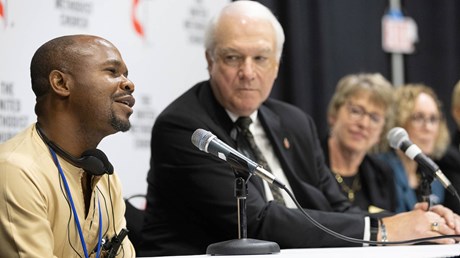 The top legislative body of the United Methodist Church passed a series of measures Thursday to restructure the worldwide denomination to give each region greater equity in tailoring church life to its own customs and traditions.The primary measure, voted on as the UMC General Conference met at the Charlotte Convention Center in North Carolina, was an amendment to the church’s constitution to divide the denomination into four equal regions—Africa, Europe, the Philippines, and the United States.According to the plan, each region would be able to customize part of the denomination’s rulebook, the Book of Discipline, to fit local needs. While church regions in Africa, the Philippines, and Europe have already enjoyed some leeway in customizing church life, the United States has not.The vote on the constitutional amendment passed 586–164, or by 78 percent, which means it surpassed the two-thirds majority needed for constitutional amendments. It must now go before each smaller church region, called an annual conference, for ratification by the end of 2025.If ratified by two-thirds of delegates to the annual conferences, the restructuring would allow the four regions to set their own qualifications for ordaining clergy and lay leaders; publish their own hymnal and rituals, including rites for marriage; and establish its own judicial courts. A new Book of Discipline would have one section that could be revised and tailored for each of the four regional conferences.The two-week worldwide meeting is the first meeting of the General Conference in five years, due mostly to delays associated with the COVID-19 pandemic. It follows a painful schism that has split some 7,600 US-based churches from the denomination—a ...Continue reading... The top legislative body of the United Methodist Church passed a series of measures Thursday to restructure the worldwide denomination to give each region greater equity in tailoring church life to its own customs and traditions.The primary measure, voted on as the UMC General Conference met at the Charlotte Convention Center in North Carolina, was an amendment to the church’s constitution to divide the denomination into four equal regions—Africa, Europe, the Philippines, and the United States.According to the plan, each region would be able to customize part of the denomination’s rulebook, the Book of Discipline, to fit local needs. While church regions in Africa, the Philippines, and Europe have already enjoyed some leeway in customizing church life, the United States has not.The vote on the constitutional amendment passed 586–164, or by 78 percent, which means it surpassed the two-thirds majority needed for constitutional amendments. It must now go before each smaller church region, called an annual conference, for ratification by the end of 2025.If ratified by two-thirds of delegates to the annual conferences, the restructuring would allow the four regions to set their own qualifications for ordaining clergy and lay leaders; publish their own hymnal and rituals, including rites for marriage; and establish its own judicial courts. A new Book of Discipline would have one section that could be revised and tailored for each of the four regional conferences.The two-week worldwide meeting is the first meeting of the General Conference in five years, due mostly to delays associated with the COVID-19 pandemic. It follows a painful schism that has split some 7,600 US-based churches from the denomination—a ...Continue reading... |
Beyoncé's right. Whether listening to Cowboy Carter or reading theology, diversity is a good thing.
 I wasn’t planning to listen to Cowboy Carter, the eighth studio album from American singer and songwriter Beyoncé. I’ve always had a love for her music—but country has never been my thing.Plans changed when I started to read what people were writing about the record, from comments on social media to reviews in major publications. Their reactions were bitter, even cruel. “Beyoncé’s ‘Cowboy Carter’ isn’t a country album. It’s worse,” proclaimed one review in The Washington Post. “Beyoncé has chosen to do Dolly Parton karaoke,” writes the reviewer. “She sounds like she’s doing Wild West bedroom cosplay in outer space.”“The lefties in the entertainment industry just won’t leave any area alone, right?” asked an interviewer on a One America News program. “They’ve got to make their mark, just like a dog in a dog walk park,” responded the interviewee.It’s not that Cowboy Carter is exempt from criticism. Its genre-blending experimentation won’t be to everyone’s taste. Some listeners may have reservations about Beyoncé’s departure from her earlier pop and R & B records. That’s fine. Music, like all art forms, is subjective. Thoughtful critique can serve as a means for musicians to grow as artists, and to engage audiences in meaningful ways.But that’s different from implying that Beyoncé can’t and shouldn’t sing country music simply because of who she is: not a white man from a rural small town, but a Black woman raised in Houston. A “stay in your place” undercurrent cuts through how critics have spoken about her ...Continue reading... I wasn’t planning to listen to Cowboy Carter, the eighth studio album from American singer and songwriter Beyoncé. I’ve always had a love for her music—but country has never been my thing.Plans changed when I started to read what people were writing about the record, from comments on social media to reviews in major publications. Their reactions were bitter, even cruel. “Beyoncé’s ‘Cowboy Carter’ isn’t a country album. It’s worse,” proclaimed one review in The Washington Post. “Beyoncé has chosen to do Dolly Parton karaoke,” writes the reviewer. “She sounds like she’s doing Wild West bedroom cosplay in outer space.”“The lefties in the entertainment industry just won’t leave any area alone, right?” asked an interviewer on a One America News program. “They’ve got to make their mark, just like a dog in a dog walk park,” responded the interviewee.It’s not that Cowboy Carter is exempt from criticism. Its genre-blending experimentation won’t be to everyone’s taste. Some listeners may have reservations about Beyoncé’s departure from her earlier pop and R & B records. That’s fine. Music, like all art forms, is subjective. Thoughtful critique can serve as a means for musicians to grow as artists, and to engage audiences in meaningful ways.But that’s different from implying that Beyoncé can’t and shouldn’t sing country music simply because of who she is: not a white man from a rural small town, but a Black woman raised in Houston. A “stay in your place” undercurrent cuts through how critics have spoken about her ...Continue reading... |
The world is realizing anew that our faith has tangible benefits. This is an opportunity for the gospel.
 As Christianity continues to decline in the West, the broader world has begun to notice something’s missing. There seems to be a growing awareness that—for all the scandals and failings of the church—the loss of a Christian culture leaves us all worse off, and that there are benefits to being a Christian and to living in a Christian society.For example, Derek Thompson recently wrote in The Atlantic about the loss of community that comes with declining church attendance. “Maybe religion, for all of its faults, works a bit like a retaining wall,” he concluded, “hold[ing] back the destabilizing pressure of American hyper-individualism, which threatens to swell and spill over in its absence.”Likewise, Harvard scholar Tyler J. VanderWeele has extensively researched the benefits of participation in religious services, finding that it leads to improved mental and physical health, happiness, and sense of meaning. Statistically, going to church regularly will help you flourish as a human being. As Brad Wilcox, a professor at the University of Virginia, has shown, regular church attendance even correlates with a more satisfying sex life!And then you have those like former atheist Ayaan Hirsi Ali who explain their conversion to Christianity at least partly as a response to the decay of the contemporary world, a world threatened by “woke ideology,” “global Islam,” and authoritarianism. “The only credible answer, I believe, lies in our desire to uphold the legacy of the Judeo-Christian tradition,” Hirsi Ali said in an essay announcing her new faith. Famous atheist Richard Dawkins objected to Hirsi Ali’s conversion yet seems to ...Continue reading... As Christianity continues to decline in the West, the broader world has begun to notice something’s missing. There seems to be a growing awareness that—for all the scandals and failings of the church—the loss of a Christian culture leaves us all worse off, and that there are benefits to being a Christian and to living in a Christian society.For example, Derek Thompson recently wrote in The Atlantic about the loss of community that comes with declining church attendance. “Maybe religion, for all of its faults, works a bit like a retaining wall,” he concluded, “hold[ing] back the destabilizing pressure of American hyper-individualism, which threatens to swell and spill over in its absence.”Likewise, Harvard scholar Tyler J. VanderWeele has extensively researched the benefits of participation in religious services, finding that it leads to improved mental and physical health, happiness, and sense of meaning. Statistically, going to church regularly will help you flourish as a human being. As Brad Wilcox, a professor at the University of Virginia, has shown, regular church attendance even correlates with a more satisfying sex life!And then you have those like former atheist Ayaan Hirsi Ali who explain their conversion to Christianity at least partly as a response to the decay of the contemporary world, a world threatened by “woke ideology,” “global Islam,” and authoritarianism. “The only credible answer, I believe, lies in our desire to uphold the legacy of the Judeo-Christian tradition,” Hirsi Ali said in an essay announcing her new faith. Famous atheist Richard Dawkins objected to Hirsi Ali’s conversion yet seems to ...Continue reading... |
How the keeper of the beat is adapting to shifts in worship music.
 It was a church drummer’s worst nightmare. In the middle of a service, David Wagner was playing “Heaven Invade” with his worship band when his in-ear monitors stopped working.Wagner posted a clip on Instagram of what happened. It includes the audio that should have been coming through in his monitors: a mix of the sound from the band, some added reverb, and of course, the click track—a repetitive tapping sound that keeps time, usually sounding for each beat. Halfway through the video, one of the vocalists—his wife—passes him a new pair of headphones.The role of the worship drummer has changed a lot over the past 20 years. In addition to the evolving sound of worship music—moving away from rock and toward electronic dance music— drummers have adjusted to new production setups, becoming the person on stage who makes sure that musicians and tech are fully in sync.Since the rise of contemporary worship bands during the late 1990s, many churches have adopted technologies that were once reserved for live concerts in stadiums and large auditoriums, where musicians needed in-ear monitors and click tracks due to crowd noise and echoes.For veteran church drummers, these changes are pushing them to develop new skills and to adapt their approach to the music. Some say these shifts are making drumming more boring, lower stakes, and monotonous. Others are finding that new tools allow them to be creative, to explore using their instruments in different ways, and to experience new freedom as worshipers on stage—even if they are behind a Plexiglas cage.Wagner, who has been a drummer for 12 years, moved to a church in Murray, Kentucky, that uses in-ear monitors (IEMs) about 3 years ago. ...Continue reading... It was a church drummer’s worst nightmare. In the middle of a service, David Wagner was playing “Heaven Invade” with his worship band when his in-ear monitors stopped working.Wagner posted a clip on Instagram of what happened. It includes the audio that should have been coming through in his monitors: a mix of the sound from the band, some added reverb, and of course, the click track—a repetitive tapping sound that keeps time, usually sounding for each beat. Halfway through the video, one of the vocalists—his wife—passes him a new pair of headphones.The role of the worship drummer has changed a lot over the past 20 years. In addition to the evolving sound of worship music—moving away from rock and toward electronic dance music— drummers have adjusted to new production setups, becoming the person on stage who makes sure that musicians and tech are fully in sync.Since the rise of contemporary worship bands during the late 1990s, many churches have adopted technologies that were once reserved for live concerts in stadiums and large auditoriums, where musicians needed in-ear monitors and click tracks due to crowd noise and echoes.For veteran church drummers, these changes are pushing them to develop new skills and to adapt their approach to the music. Some say these shifts are making drumming more boring, lower stakes, and monotonous. Others are finding that new tools allow them to be creative, to explore using their instruments in different ways, and to experience new freedom as worshipers on stage—even if they are behind a Plexiglas cage.Wagner, who has been a drummer for 12 years, moved to a church in Murray, Kentucky, that uses in-ear monitors (IEMs) about 3 years ago. ...Continue reading... |
After lobbying from fellow Southern Baptists and Christians affected by the war, the House speaker moves a package forward.
 When deciding whether to protect his place in leadership as House speaker or go against his party to do what he believed was right, Mike Johnson turned to prayer.It had been weeks of hearing intelligence briefings and pleas from fellow Christians when Johnson ultimately sided with his convictions rather than conceding to the Republican Party’s isolationist wing. He backed a $95 billion foreign aid package that, despite the opposition of 112 GOP legislators, overwhelmingly passed the House of Representatives last weekend.Like many of his fellow Republicans, Johnson had initially opposed further aid to Ukraine, voting against it prior to becoming speaker and waiting months to move forward with an aid package after the Senate approved its version in February.He “went through a transformation,” according to one GOP colleague, House Foreign Affairs Committee chairman Michael McCaul. The shift may have come in part due to the influence of Ukrainian evangelicals, fellow Christian leaders, and his personal faith.“He got down on his knees, and he prayed for guidance and said, ‘Look, tell me. What is the right thing to do here?’” the Texas congressman told NOTUS’s Haley Byrd Wilt. The next day, Johnson said to McCaul, “I want to be on the right side of history.”The House vote on the Ukraine provisions, around $61 billion, was 311 to 112; a majority of Johnson’s colleagues voted against the measure, while aid to Israel and Taiwan had broader support. The Senate cleared the package Tuesday in a bipartisan 79–18 vote. Now the measure heads to President Joe Biden’s desk.Ukrainian leadership had grown more vocal about depleted weapons ...Continue reading... When deciding whether to protect his place in leadership as House speaker or go against his party to do what he believed was right, Mike Johnson turned to prayer.It had been weeks of hearing intelligence briefings and pleas from fellow Christians when Johnson ultimately sided with his convictions rather than conceding to the Republican Party’s isolationist wing. He backed a $95 billion foreign aid package that, despite the opposition of 112 GOP legislators, overwhelmingly passed the House of Representatives last weekend.Like many of his fellow Republicans, Johnson had initially opposed further aid to Ukraine, voting against it prior to becoming speaker and waiting months to move forward with an aid package after the Senate approved its version in February.He “went through a transformation,” according to one GOP colleague, House Foreign Affairs Committee chairman Michael McCaul. The shift may have come in part due to the influence of Ukrainian evangelicals, fellow Christian leaders, and his personal faith.“He got down on his knees, and he prayed for guidance and said, ‘Look, tell me. What is the right thing to do here?’” the Texas congressman told NOTUS’s Haley Byrd Wilt. The next day, Johnson said to McCaul, “I want to be on the right side of history.”The House vote on the Ukraine provisions, around $61 billion, was 311 to 112; a majority of Johnson’s colleagues voted against the measure, while aid to Israel and Taiwan had broader support. The Senate cleared the package Tuesday in a bipartisan 79–18 vote. Now the measure heads to President Joe Biden’s desk.Ukrainian leadership had grown more vocal about depleted weapons ...Continue reading... |
NIL deals in college athletics present new challenges—and opportunities—for colleges and students.
 When Deverin Muff played Division I college basketball at Eastern Kentucky University, student athletes weren’t allowed to earn money off their name, image, and likeness (NIL)—their personal brand.Now he’s a professor at the university, and some of the players in his classes have agents. An NCAA policy change in 2021—heralded by Muff and other Christian athletes as a matter of fairness—allows college athletes to earn money beyond financial aid or scholarships.“This is a matter of justice, frankly. … It righted a historic wrong,” said Pepperdine University sports administration professor Alicia Jessop. College sports, especially football and basketball, draw in billions in revenue.Christians in college athletics have welcomed the change to allow NIL deals, according to interviews with CT. But they are also navigating an unknown landscape and finding challenges along the way. The NCAA itself is still reeling from the resulting shifts in the economics of college sports, passing additional NIL rules just last week.Jessop was recently teaching a class on NIL deals at Pepperdine, where she is also the faculty representative to the NCAA. One student decided to put the class into practice immediately and reached out to a sunglasses brand to pitch a deal. In a short time, the student had a free pair of sunglasses delivered.“It’s a teaching tool,” said Jessop. “They think they’re learning about NIL so they’re focused, but they’re getting a whole business curriculum put in front of them.”Under the new NCAA rules passed last week, schools can be more directly involved in NIL deals and they can offer a support system that helps educate students ...Continue reading... When Deverin Muff played Division I college basketball at Eastern Kentucky University, student athletes weren’t allowed to earn money off their name, image, and likeness (NIL)—their personal brand.Now he’s a professor at the university, and some of the players in his classes have agents. An NCAA policy change in 2021—heralded by Muff and other Christian athletes as a matter of fairness—allows college athletes to earn money beyond financial aid or scholarships.“This is a matter of justice, frankly. … It righted a historic wrong,” said Pepperdine University sports administration professor Alicia Jessop. College sports, especially football and basketball, draw in billions in revenue.Christians in college athletics have welcomed the change to allow NIL deals, according to interviews with CT. But they are also navigating an unknown landscape and finding challenges along the way. The NCAA itself is still reeling from the resulting shifts in the economics of college sports, passing additional NIL rules just last week.Jessop was recently teaching a class on NIL deals at Pepperdine, where she is also the faculty representative to the NCAA. One student decided to put the class into practice immediately and reached out to a sunglasses brand to pitch a deal. In a short time, the student had a free pair of sunglasses delivered.“It’s a teaching tool,” said Jessop. “They think they’re learning about NIL so they’re focused, but they’re getting a whole business curriculum put in front of them.”Under the new NCAA rules passed last week, schools can be more directly involved in NIL deals and they can offer a support system that helps educate students ...Continue reading... |
Christians can disciple each other toward action, prayer, and hope.
 I’m 26 and mostly full of enthusiasm for the future. But when I think about the heat waves, floods, and humanitarian crises that I’ll likely experience in my lifetime, I feel a sense of dread. And even more so when I think about the future of my children and my children’s children. I wonder if they’ll get to experience all the beauty of God’s creation that I so cherished while growing up.As a young farmer, I feel my chest tighten as I watch weather patterns and the seasons become more and more erratic. I worry if there’ll be wars for food and water with a warmer climate, or if water sources will be polluted and the soil will be eroded.Many people, especially my age, feel the same way. A recent survey asked 10,000 young people across the world about their thoughts and feelings regarding climate change. According to the findings, three out of four young people think the future is frightening. More than half reported feelings of sadness, anxiety, anger, and powerlessness when thinking about climate change. And around 45 percent of respondents said their feelings about climate change negatively affected their daily life and functioning.These fears have become so prevalent in our generation that a new term has been coined: eco-anxiety.In a way, young people today have fulfilled climate activist Greta Thunberg’s provocation to leaders at the World Economic Forum in Davos, Switzerland, in 2019: “I don't want you to be hopeful, I want you to panic. I want you to feel the fear I feel every day.”But while I respect Thunberg’s contribution to putting climate change on the world’s agenda, I disagree with her on this. I don’t believe that panic will help us. ...Continue reading... I’m 26 and mostly full of enthusiasm for the future. But when I think about the heat waves, floods, and humanitarian crises that I’ll likely experience in my lifetime, I feel a sense of dread. And even more so when I think about the future of my children and my children’s children. I wonder if they’ll get to experience all the beauty of God’s creation that I so cherished while growing up.As a young farmer, I feel my chest tighten as I watch weather patterns and the seasons become more and more erratic. I worry if there’ll be wars for food and water with a warmer climate, or if water sources will be polluted and the soil will be eroded.Many people, especially my age, feel the same way. A recent survey asked 10,000 young people across the world about their thoughts and feelings regarding climate change. According to the findings, three out of four young people think the future is frightening. More than half reported feelings of sadness, anxiety, anger, and powerlessness when thinking about climate change. And around 45 percent of respondents said their feelings about climate change negatively affected their daily life and functioning.These fears have become so prevalent in our generation that a new term has been coined: eco-anxiety.In a way, young people today have fulfilled climate activist Greta Thunberg’s provocation to leaders at the World Economic Forum in Davos, Switzerland, in 2019: “I don't want you to be hopeful, I want you to panic. I want you to feel the fear I feel every day.”But while I respect Thunberg’s contribution to putting climate change on the world’s agenda, I disagree with her on this. I don’t believe that panic will help us. ...Continue reading... |
C.S. Lewis recommended discernment over diatribes in exactly the moments we're most eager to indulge in critique.
 I’d just finished reading one of C. S. Lewis’s lesser-known books, Studies in Words, when I happened upon a recent New York Times report on evangelical support for Donald Trump. The former president’s summer of legal woes is off to an early start, and many have asked whether the present trial (or another) will lose him support ahead of Election Day. The answer—among his base, anyway—is undoubtedly no.If anything, the opposite is true: In some circles, his adversities are hailed as a kind of vindication, his endurance on the campaign trail as a sign of divine blessing. “For some of Mr. Trump’s supporters, the political attacks and legal peril he faces are nothing short of biblical,” the report said. “They’ve crucified him worse than Jesus,” one Trump enthusiast told the Times.Now, the Lewis book is mostly fascinating linguistic history, but the last chapter examines how we use language to dispense criticism, and its final two pages are precisely the warning our political culture needs as we plod through another contentious election. It’s certainly the warning I need and the warning I hope fellow Christians will heed, particularly those of us in politically diverse families, friend groups, and congregations.I realized how much I needed it as I read that Times article. It published on Easter Monday and I read it the same day, the drama of Easter weekend fresh on my mind. Suffice it to say, the crucifixion line did not sit well with me.“Worse than Jesus”! I remember thinking. I agree some of this legal stuff is far-fetched, but are you kidding me? Do these people not know what crucifixion entails? Do they not know Trump probably sleeps on silk ...Continue reading... I’d just finished reading one of C. S. Lewis’s lesser-known books, Studies in Words, when I happened upon a recent New York Times report on evangelical support for Donald Trump. The former president’s summer of legal woes is off to an early start, and many have asked whether the present trial (or another) will lose him support ahead of Election Day. The answer—among his base, anyway—is undoubtedly no.If anything, the opposite is true: In some circles, his adversities are hailed as a kind of vindication, his endurance on the campaign trail as a sign of divine blessing. “For some of Mr. Trump’s supporters, the political attacks and legal peril he faces are nothing short of biblical,” the report said. “They’ve crucified him worse than Jesus,” one Trump enthusiast told the Times.Now, the Lewis book is mostly fascinating linguistic history, but the last chapter examines how we use language to dispense criticism, and its final two pages are precisely the warning our political culture needs as we plod through another contentious election. It’s certainly the warning I need and the warning I hope fellow Christians will heed, particularly those of us in politically diverse families, friend groups, and congregations.I realized how much I needed it as I read that Times article. It published on Easter Monday and I read it the same day, the drama of Easter weekend fresh on my mind. Suffice it to say, the crucifixion line did not sit well with me.“Worse than Jesus”! I remember thinking. I agree some of this legal stuff is far-fetched, but are you kidding me? Do these people not know what crucifixion entails? Do they not know Trump probably sleeps on silk ...Continue reading... |
When I married into a Jewish family, antisemitism hit home. Now, the holy day reminds me of our future hope.
 On October 7, 2023, my mother-in-law called.“Have you seen the news?” she asked urgently. “Terrorists have attacked Israel. Where are the kids? Are they at home with you? Can you keep them home from school this week?”She knows antisemitism all too well. Her husband is a Jew who traces his lineage back to the tribe of Levi. His ancestors immigrated to America from Poland and Russia in the early 1900s. They maintained their heritage and ancient faith through centuries of opposition, faithfully attending synagogue, reading from the Torah, and celebrating holidays such as Passover. They broke bread and drank wine in remembrance of when God rescued their people out of slavery in Egypt.Today, my father-in-law is a Christian. As we break the matzoh, we remember Jesus, whose body was broken for us. As we drink the wine, we remember his blood poured out for the salvation of many. This meal, while it reminds us of our Savior who freed us from slavery to sin, is also a promise of what is to come. For the generations who have suffered, this meal is a reminder of God’s redemption. It gives us hope.Though he rarely talks about it, my father-in-law has told us stories about his childhood growing up in Miami. His family went to synagogue every Saturday, and he and his Jewish friends attended Hebrew school five days a week. His father owned a grocery store in the 1950s and ’60s, working sunup to sundown every day except the Sabbath. He supported his family in a community where Jewish, Black, and Hispanic people were often unwelcome.“I remember going to the beach and seeing signs on the bathroom doors that read, ‘No dogs or Jews allowed,’” my father-in-law told me. “I remember ...Continue reading... On October 7, 2023, my mother-in-law called.“Have you seen the news?” she asked urgently. “Terrorists have attacked Israel. Where are the kids? Are they at home with you? Can you keep them home from school this week?”She knows antisemitism all too well. Her husband is a Jew who traces his lineage back to the tribe of Levi. His ancestors immigrated to America from Poland and Russia in the early 1900s. They maintained their heritage and ancient faith through centuries of opposition, faithfully attending synagogue, reading from the Torah, and celebrating holidays such as Passover. They broke bread and drank wine in remembrance of when God rescued their people out of slavery in Egypt.Today, my father-in-law is a Christian. As we break the matzoh, we remember Jesus, whose body was broken for us. As we drink the wine, we remember his blood poured out for the salvation of many. This meal, while it reminds us of our Savior who freed us from slavery to sin, is also a promise of what is to come. For the generations who have suffered, this meal is a reminder of God’s redemption. It gives us hope.Though he rarely talks about it, my father-in-law has told us stories about his childhood growing up in Miami. His family went to synagogue every Saturday, and he and his Jewish friends attended Hebrew school five days a week. His father owned a grocery store in the 1950s and ’60s, working sunup to sundown every day except the Sabbath. He supported his family in a community where Jewish, Black, and Hispanic people were often unwelcome.“I remember going to the beach and seeing signs on the bathroom doors that read, ‘No dogs or Jews allowed,’” my father-in-law told me. “I remember ...Continue reading... |
Studies find that while less than a third of Americans trust church leaders, 90 percent of Filipinos do.
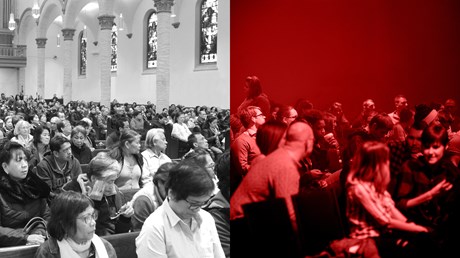 While less than a third of Americans rate clergy as highly honest and ethical, across the globe in the Philippines, 91 percent of the public trusts religious leaders, according to EON Group’s 2021 Philippine Trust Index. Respondents of the survey ranked pastors as the most trusted leaders in Filipino society, compared to a Gallup poll that found clergy in the US ranked lower than 10 other professions, including chiropractors and police officers.“When people outside of church find out I’m a pastor, their demeanor changes out of respect,” said Aldrin Peñamora, director of the Philippine Council of Evangelical Churches’ Justice, Peace, and Reconciliation Commission. Some people even ask him for prayer.The disconnect is rooted in cultural differences, religion’s role in society, as well as the impact of church scandals. Still, pastors from both countries noted the importance of having pastors engage with their congregations and local communities to build trust.Drivers of trust in the Filipino churchIn the Philippines, Catholics make up 80 percent of the population, while evangelicals make up about 3 percent. Catholicism came to the Philippines through Spanish colonialism and stuck as Filipinos made their faith their own. Today, the Catholic faith has become a cultural attribute of Filipino life.The high view of church leaders also reflects traditional Filipino values, said Peñamora: “Filipino culture values respecting the elderly, which spills over to their submission to people in authority, including religious authority.”In the Philippines, older people are considered wise, and they provide a sense of order and direction to the life of the community, Peñamora ...Continue reading... While less than a third of Americans rate clergy as highly honest and ethical, across the globe in the Philippines, 91 percent of the public trusts religious leaders, according to EON Group’s 2021 Philippine Trust Index. Respondents of the survey ranked pastors as the most trusted leaders in Filipino society, compared to a Gallup poll that found clergy in the US ranked lower than 10 other professions, including chiropractors and police officers.“When people outside of church find out I’m a pastor, their demeanor changes out of respect,” said Aldrin Peñamora, director of the Philippine Council of Evangelical Churches’ Justice, Peace, and Reconciliation Commission. Some people even ask him for prayer.The disconnect is rooted in cultural differences, religion’s role in society, as well as the impact of church scandals. Still, pastors from both countries noted the importance of having pastors engage with their congregations and local communities to build trust.Drivers of trust in the Filipino churchIn the Philippines, Catholics make up 80 percent of the population, while evangelicals make up about 3 percent. Catholicism came to the Philippines through Spanish colonialism and stuck as Filipinos made their faith their own. Today, the Catholic faith has become a cultural attribute of Filipino life.The high view of church leaders also reflects traditional Filipino values, said Peñamora: “Filipino culture values respecting the elderly, which spills over to their submission to people in authority, including religious authority.”In the Philippines, older people are considered wise, and they provide a sense of order and direction to the life of the community, Peñamora ...Continue reading... |
I grew up as a climate change denier. Now I understand we must care for God's creation and people alike.
 I grew up believing that Earth Day was a liberal holiday. Climate change was a lie, a ploy by leftist political activists to dismantle US economic superiority by undermining domestic energy production and crippling our industries. Humans had a God-given right to have “dominion” (Gen. 1:26) over the earth, I was taught. The natural world was ours to “steward” (Gen. 2:15), which to us meant it could be used as desired to improve the lives of industrious, hard-working families like ours.Everywhere I turned, I saw this definition of stewardship in action. It was well-intended but, I now think, ill-considered. My home then was the Texas Panhandle, atop the Ogallala Aquifer. The Ogallala is the largest aquifer in the nation, but after decades of High Plains farmers tapping it with abandon, it’s drying up.These days, I live five hours south of my hometown atop another major geological formation: the Permian Basin, the nation’s most productive oil field and the heart of the US oil and gas industry. Thirteen years ago, I cried when we moved to Midland, Texas, for my husband’s new job with a natural gas company, not wanting my family to be part of an industry I’d come to believe was destroying the earth. Needless to say, by then, I no longer believed climate change was a lie.I’d spent nearly four years in a small village outside of Beijing where the drainage creek bubbled with dangerously toxic sludge; we’d go days without seeing the sun through the industrial haze; and blowing my nose in the winter would leave me with a tissue blackened with coal dust. I didn’t have to be a climate scientist to conclude that there would be consequences for ...Continue reading... I grew up believing that Earth Day was a liberal holiday. Climate change was a lie, a ploy by leftist political activists to dismantle US economic superiority by undermining domestic energy production and crippling our industries. Humans had a God-given right to have “dominion” (Gen. 1:26) over the earth, I was taught. The natural world was ours to “steward” (Gen. 2:15), which to us meant it could be used as desired to improve the lives of industrious, hard-working families like ours.Everywhere I turned, I saw this definition of stewardship in action. It was well-intended but, I now think, ill-considered. My home then was the Texas Panhandle, atop the Ogallala Aquifer. The Ogallala is the largest aquifer in the nation, but after decades of High Plains farmers tapping it with abandon, it’s drying up.These days, I live five hours south of my hometown atop another major geological formation: the Permian Basin, the nation’s most productive oil field and the heart of the US oil and gas industry. Thirteen years ago, I cried when we moved to Midland, Texas, for my husband’s new job with a natural gas company, not wanting my family to be part of an industry I’d come to believe was destroying the earth. Needless to say, by then, I no longer believed climate change was a lie.I’d spent nearly four years in a small village outside of Beijing where the drainage creek bubbled with dangerously toxic sludge; we’d go days without seeing the sun through the industrial haze; and blowing my nose in the winter would leave me with a tissue blackened with coal dust. I didn’t have to be a climate scientist to conclude that there would be consequences for ...Continue reading... |
Series like The Wingfeather Saga bring children along for the adventure of following Jesus.
 I picked up the first book reluctantly. Was I really going to spend my children’s nap time reading children’s fiction? But The Wingfeather Saga had been recommended to me by so many fans that I eventually joined the throngs of Christian adults and kids who’ve enjoyed the series.From the start, author Andrew Peterson captivated my imagination, building a world I could recognize while pushing the limits of familiarity. Aerwier has a bookshop with a nerdy owner; the three Igby siblings enjoy exploring its packed shelves. So normal! But just across the street is a city prison run by lizard monsters called Fangs. Not so normal.The Wingfeather books have since been adapted into an animated series; the second season premiered at the beginning of this month, with new episodes released weekly. I remember the Christian animations from my childhood—Bibleman, Psalty the Singing Songbook, and VeggieTales —as either simplistic retellings of Bible stories or moralizing lessons. These shows did a fine job of teaching me what God expected. But they didn’t captivate me with the idea of following Jesus.The animated Wingfeather, by contrast, is lighthearted and sincere, witty without resorting to gimmicks. It cultivates endearing characters without creating familiar Christian caricatures.What makes a good Christian children’s show? Here are four things The Wingfeather Saga does well that I hope would be true of any Christian program that I watch with my kids.The show invites kids along for the adventure.One of the quickest ways to bore kids is to talk at them. Shows that offer not much more than monologues, telling children what they should think and do, will rarely capture their hearts.This principle ...Continue reading... I picked up the first book reluctantly. Was I really going to spend my children’s nap time reading children’s fiction? But The Wingfeather Saga had been recommended to me by so many fans that I eventually joined the throngs of Christian adults and kids who’ve enjoyed the series.From the start, author Andrew Peterson captivated my imagination, building a world I could recognize while pushing the limits of familiarity. Aerwier has a bookshop with a nerdy owner; the three Igby siblings enjoy exploring its packed shelves. So normal! But just across the street is a city prison run by lizard monsters called Fangs. Not so normal.The Wingfeather books have since been adapted into an animated series; the second season premiered at the beginning of this month, with new episodes released weekly. I remember the Christian animations from my childhood—Bibleman, Psalty the Singing Songbook, and VeggieTales —as either simplistic retellings of Bible stories or moralizing lessons. These shows did a fine job of teaching me what God expected. But they didn’t captivate me with the idea of following Jesus.The animated Wingfeather, by contrast, is lighthearted and sincere, witty without resorting to gimmicks. It cultivates endearing characters without creating familiar Christian caricatures.What makes a good Christian children’s show? Here are four things The Wingfeather Saga does well that I hope would be true of any Christian program that I watch with my kids.The show invites kids along for the adventure.One of the quickest ways to bore kids is to talk at them. Shows that offer not much more than monologues, telling children what they should think and do, will rarely capture their hearts.This principle ...Continue reading... |
A veteran missiologist shares a lifetime of lessons on bringing the gospel into unfamiliar settings.
 In an important new book, missiologist Darrell Whiteman tells a revealing story about a missionary who had been preaching in a particular community. Without realizing it, the missionary gave offense by wearing expensive shoes in a place where people couldn’t afford shoes of any type. For Whiteman, this anecdote illustrates how much missionaries need to learn—and how many presumptions they might need to abandon—in order to bring the gospel to people in other cultures.Whiteman’s book Crossing Cultures with the Gospel: Anthropological Wisdom for Effective Christian Witness, challenges his readers—and missionaries in particular—to recognize the possible ethnocentrism in their perspective, which can distort and impede their ability to communicate well across cultural boundaries. As he explains, each culture has its own ways of understanding and coping with the problems of life. All of us understand biblical truths in ways that seem natural to us in our own cultures but not to people who have grown up in other cultures.In each community, traditions of communication and interaction develop over time, resulting in distinct customs. Every community has its own sense of the past, its own traditions of loyalty and obligation, its own rules of courtesy, and its own conceptions of virtue and honor. If missionaries are to communicate with people who have grown up in other cultures, argues Whiteman, they must lay aside their own presuppositions and cultural conventions and commit to acquiring knowledge of unfamiliar customs and ways of thought.Watching, listening, and asking questionsThe missionary project, as Whiteman reminds us, is to insert the universal message of the gospel “within the very ...Continue reading... In an important new book, missiologist Darrell Whiteman tells a revealing story about a missionary who had been preaching in a particular community. Without realizing it, the missionary gave offense by wearing expensive shoes in a place where people couldn’t afford shoes of any type. For Whiteman, this anecdote illustrates how much missionaries need to learn—and how many presumptions they might need to abandon—in order to bring the gospel to people in other cultures.Whiteman’s book Crossing Cultures with the Gospel: Anthropological Wisdom for Effective Christian Witness, challenges his readers—and missionaries in particular—to recognize the possible ethnocentrism in their perspective, which can distort and impede their ability to communicate well across cultural boundaries. As he explains, each culture has its own ways of understanding and coping with the problems of life. All of us understand biblical truths in ways that seem natural to us in our own cultures but not to people who have grown up in other cultures.In each community, traditions of communication and interaction develop over time, resulting in distinct customs. Every community has its own sense of the past, its own traditions of loyalty and obligation, its own rules of courtesy, and its own conceptions of virtue and honor. If missionaries are to communicate with people who have grown up in other cultures, argues Whiteman, they must lay aside their own presuppositions and cultural conventions and commit to acquiring knowledge of unfamiliar customs and ways of thought.Watching, listening, and asking questionsThe missionary project, as Whiteman reminds us, is to insert the universal message of the gospel “within the very ...Continue reading... |
The popular kids series reminds parents that playfulness is next to godliness.
 When my oldest daughter, Elaine, was four, I watched her chase a soap bubble around the yard, utterly spellbound, and it struck me as a tiny window into how God must have felt as he watched Adam and Eve encounter each of the animals in Eden. Likewise, when I discovered that my youngest, Olivia, had held a full conversation with me while cutting our kitten’s whiskers under the table, I felt attuned with God’s anger when he flung his judgments at Israel through the prophets.These kinds of moments, and a thousand others, make raising kids and building a family spiritually illuminating tasks—especially when they ask theologically stimulating questions like “Does Jesus wear undies?” And although the creators of Bluey, an Emmy-awarded animated kids series, seem to have no overtly religious leanings, the show unexpectedly taps into unseen realities.If you haven’t yet discovered Bluey, let me catch you up. The series, streaming on Disney+, centers around a family of Australian blue heelers: six-year-old Bluey, her younger sister Bingo, Mum (Chilli), and Dad (Bandit). Each episode is less than 10 minutes long and targets a preschool audience—but the popular show draws all ages, and, in 2023, was the second-most acquired streaming program with 43.9 billion minutes consumed.When the producers announced that a longer episode was slated for season 3, the public grew panicked that the show may be ending (thankfully, it’s not!), revealing just how deeply the series meets a need in our culture—and I think it’s worth exploring why.The Heelers are just your average Australian family, with no superpowers or high-stakes problems to solve. But through their ...Continue reading... When my oldest daughter, Elaine, was four, I watched her chase a soap bubble around the yard, utterly spellbound, and it struck me as a tiny window into how God must have felt as he watched Adam and Eve encounter each of the animals in Eden. Likewise, when I discovered that my youngest, Olivia, had held a full conversation with me while cutting our kitten’s whiskers under the table, I felt attuned with God’s anger when he flung his judgments at Israel through the prophets.These kinds of moments, and a thousand others, make raising kids and building a family spiritually illuminating tasks—especially when they ask theologically stimulating questions like “Does Jesus wear undies?” And although the creators of Bluey, an Emmy-awarded animated kids series, seem to have no overtly religious leanings, the show unexpectedly taps into unseen realities.If you haven’t yet discovered Bluey, let me catch you up. The series, streaming on Disney+, centers around a family of Australian blue heelers: six-year-old Bluey, her younger sister Bingo, Mum (Chilli), and Dad (Bandit). Each episode is less than 10 minutes long and targets a preschool audience—but the popular show draws all ages, and, in 2023, was the second-most acquired streaming program with 43.9 billion minutes consumed.When the producers announced that a longer episode was slated for season 3, the public grew panicked that the show may be ending (thankfully, it’s not!), revealing just how deeply the series meets a need in our culture—and I think it’s worth exploring why.The Heelers are just your average Australian family, with no superpowers or high-stakes problems to solve. But through their ...Continue reading... |
President William Ruto commissioned church leaders to meet with Haitian law enforcement, military representatives, and a gang leader to discuss Kenya's security mission.
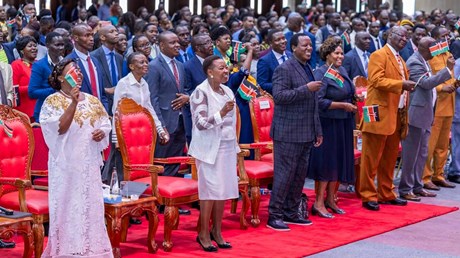 Kenya’s leaders aren’t saying much publicly about the security force they plan to send to gang-embattled Haiti. But they’re talking a whole lot with God.Last month, as armed groups escalated their insurgency in Port-au-Prince and plunged Haiti deeper into a historic humanitarian crisis, pastors advising Kenya’s government met for three days at a hotel in Nairobi to pray.In a sky-blue conference room at the Weston Hotel, three Kenyan pastors joined Haitian and American ministry leaders and Kenya’s first lady, Rachel Ruto, to plead for divine assistance for the beleaguered Caribbean country. They prayed for the 2,500-person multinational police force Kenya has volunteered to lead to help Haitian law enforcement. At one point, meeting participants told CT, group members wept.After two days of prayer, the first lady dropped in on an album release party in another part of the Weston, which President William Ruto owns, and announced her office had formed a prayer committee for Haiti. “We cannot allow our police to go to Haiti without prayer,” Rachel Ruto told fans of the Kenyan gospel group 1005 Songs & More.Kenya agreed last October to spearhead a UN-authorized international security mission to Haiti, but the deployment has faced various delays, including legal challenges and questions about funding.The prayer marathon was part of a broader effort by the Ruto administration to strategize “a spiritual solution for our police and people of Haiti,” according to the first lady. The initiative, coordinated by the administration’s “faith diplomacy” office, has so far included a national prayer gathering, a 40-day prayer guide for Haiti, and an official fact-finding ...Continue reading... Kenya’s leaders aren’t saying much publicly about the security force they plan to send to gang-embattled Haiti. But they’re talking a whole lot with God.Last month, as armed groups escalated their insurgency in Port-au-Prince and plunged Haiti deeper into a historic humanitarian crisis, pastors advising Kenya’s government met for three days at a hotel in Nairobi to pray.In a sky-blue conference room at the Weston Hotel, three Kenyan pastors joined Haitian and American ministry leaders and Kenya’s first lady, Rachel Ruto, to plead for divine assistance for the beleaguered Caribbean country. They prayed for the 2,500-person multinational police force Kenya has volunteered to lead to help Haitian law enforcement. At one point, meeting participants told CT, group members wept.After two days of prayer, the first lady dropped in on an album release party in another part of the Weston, which President William Ruto owns, and announced her office had formed a prayer committee for Haiti. “We cannot allow our police to go to Haiti without prayer,” Rachel Ruto told fans of the Kenyan gospel group 1005 Songs & More.Kenya agreed last October to spearhead a UN-authorized international security mission to Haiti, but the deployment has faced various delays, including legal challenges and questions about funding.The prayer marathon was part of a broader effort by the Ruto administration to strategize “a spiritual solution for our police and people of Haiti,” according to the first lady. The initiative, coordinated by the administration’s “faith diplomacy” office, has so far included a national prayer gathering, a 40-day prayer guide for Haiti, and an official fact-finding ...Continue reading... |
Helping marine biodiversity flourish is a means of participating in God's work, says an Indonesian theologian.
 Indonesia is the largest archipelagic nation in the world. It’s made up of an astounding 17,000 islands, with 70 percent of the population living in coastal areas. Many view the country as a divers’ haven because it is home to vibrant coral reefs teeming with colorful fish, and it’s also where the largest mangrove ecosystems on the planet exist.But my country is facing a severe marine ecological crisis today because of destructive fishing, pollution, climate change, and greenhouse gas emissions. Our ecosystem of mangroves, seagrass, and coral reefs is in decline. Fish stock is also decreasing, while other sea creatures are frequently poisoned by land-based pollution.This crisis is a serious threat in the Indonesian context, where ecological and social lives are often inseparable. Over half of the population’s annual protein intake comes from fish and seafood, and around 7 million people depend heavily on the sea for their livelihoods. But now, more than 2.5 million Indonesian households involved in small-scale fishery activities are at risk of losing their way of life and source of income. Fishing grounds are increasingly limited, triggering conflicts among traditional fishermen.Poor people in our coastal areas have suffered the most due to their dependence on the sea for survival. Many use traditional techniques and equipment such as pudi—fishing weirs that channel fish to a particular location—and bubu, fish traps made of bamboo, to collect various kinds of seafood during low tide to feed themselves.The marine ecological crisis, however, is increasingly destroying their source of food. It’s also erasing our culture of caring for the needy, in that coastal communities often give ...Continue reading... Indonesia is the largest archipelagic nation in the world. It’s made up of an astounding 17,000 islands, with 70 percent of the population living in coastal areas. Many view the country as a divers’ haven because it is home to vibrant coral reefs teeming with colorful fish, and it’s also where the largest mangrove ecosystems on the planet exist.But my country is facing a severe marine ecological crisis today because of destructive fishing, pollution, climate change, and greenhouse gas emissions. Our ecosystem of mangroves, seagrass, and coral reefs is in decline. Fish stock is also decreasing, while other sea creatures are frequently poisoned by land-based pollution.This crisis is a serious threat in the Indonesian context, where ecological and social lives are often inseparable. Over half of the population’s annual protein intake comes from fish and seafood, and around 7 million people depend heavily on the sea for their livelihoods. But now, more than 2.5 million Indonesian households involved in small-scale fishery activities are at risk of losing their way of life and source of income. Fishing grounds are increasingly limited, triggering conflicts among traditional fishermen.Poor people in our coastal areas have suffered the most due to their dependence on the sea for survival. Many use traditional techniques and equipment such as pudi—fishing weirs that channel fish to a particular location—and bubu, fish traps made of bamboo, to collect various kinds of seafood during low tide to feed themselves.The marine ecological crisis, however, is increasingly destroying their source of food. It’s also erasing our culture of caring for the needy, in that coastal communities often give ...Continue reading... |
The Grammy-winning artist was found dead at her home in Nashville at age 47.
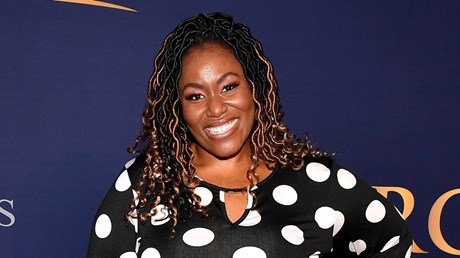 Grammy Award-winning contemporary Christian singer Mandisa Lynn Hundley, a former Lifeway Christian Resources employee and top-10 American Idol finisher, was found dead Thursday at her Nashville home, her publicist announced on social media.No cause of death was given.“We can confirm that yesterday Mandisa was found in her home deceased. At this time we do not know the cause of death or any further details,” according to an official notice posted April 19 on the official X account of the performer known simply as Mandisa.“We ask for your prayers for her family and closeknit circle of friends during this incredibly difficult time.”Before finishing in the ninth spot on American Idol’s fifth season in 2005, Mandisa worked for Lifeway as a telephone customer service representative from 2000 to 2003, Lifeway told Baptist Press.She partnered with the Lifeway women’s ministry team, performing and leading worship at some events, and later performed at Living Proof Live events.“Our team at Lifeway is heartbroken to hear of the passing of our friend and former co-worker,” Lifeway CEO Ben Mandrell told Baptist Press. “Her teammates recall the joy and kindness she brought to work every day. Our heartfelt prayers are with her family.”Lakisha Mitchell, the late wife of Southern Baptist pastor Breonus Mitchell, inspired Mandisa’s hit “Overcomer,” the title song of the album that garnered a 2014 Grammy Award for Best Contemporary Christian Music Album. Breonus Mitchell, senior pastor of Mount Gilead Baptist Church in Hermitage, Tennessee, remarried in 2018.“Obviously we are saddened ...Continue reading... Grammy Award-winning contemporary Christian singer Mandisa Lynn Hundley, a former Lifeway Christian Resources employee and top-10 American Idol finisher, was found dead Thursday at her Nashville home, her publicist announced on social media.No cause of death was given.“We can confirm that yesterday Mandisa was found in her home deceased. At this time we do not know the cause of death or any further details,” according to an official notice posted April 19 on the official X account of the performer known simply as Mandisa.“We ask for your prayers for her family and closeknit circle of friends during this incredibly difficult time.”Before finishing in the ninth spot on American Idol’s fifth season in 2005, Mandisa worked for Lifeway as a telephone customer service representative from 2000 to 2003, Lifeway told Baptist Press.She partnered with the Lifeway women’s ministry team, performing and leading worship at some events, and later performed at Living Proof Live events.“Our team at Lifeway is heartbroken to hear of the passing of our friend and former co-worker,” Lifeway CEO Ben Mandrell told Baptist Press. “Her teammates recall the joy and kindness she brought to work every day. Our heartfelt prayers are with her family.”Lakisha Mitchell, the late wife of Southern Baptist pastor Breonus Mitchell, inspired Mandisa’s hit “Overcomer,” the title song of the album that garnered a 2014 Grammy Award for Best Contemporary Christian Music Album. Breonus Mitchell, senior pastor of Mount Gilead Baptist Church in Hermitage, Tennessee, remarried in 2018.“Obviously we are saddened ...Continue reading... |
Christian artists work at the intersection of music and climate change.
 Christians love to sing about creation. Hymns like “How Great Thou Art” describe the beauty of creation that moves the church to sing, “I see the stars, I hear the rolling thunder / Thy power throughout the universe displayed.”Nature can also be a source of confusion or anxiety for believers as they observe eclipses and earthquakes and try to discern God’s role or intent in their unfolding. And as climate change more visibly impacts humans, the natural world can seem increasingly hostile, even as it remains a source of inspiration and joy for the Christian.Where is God’s hand at work? And how should we respond to mysteries and chaos in our prayers and worship?British scholar Mark Porter believes the Christian imagination can hold a complex view of creation—as can music. His research looks at the intersection of music, faith, and climate change, showing ways to engage nature beyond using it as a signpost of God’s glory, contending also with its beauty, chaos, fragility, and brutality.“There’s not just one thing that nature imagery does,” said Porter. “It can do something besides inspire an individual to look to God in worship.”Porter’s forthcoming book For the Warming of the Earth: Music, Faith, and Ecological Crisis describes how faith communities and organizations are responding to climate change and environmental crises with music, such as Resound Worship’s Doxecology album, the activism of groups like Christian Climate Action (CCA), and Catholic song festivals centered on Pope Francis’ landmark encyclical, Laudato Si’.It’s not a how-to book for worship leaders looking to more explicitly address creation care or ...Continue reading... Christians love to sing about creation. Hymns like “How Great Thou Art” describe the beauty of creation that moves the church to sing, “I see the stars, I hear the rolling thunder / Thy power throughout the universe displayed.”Nature can also be a source of confusion or anxiety for believers as they observe eclipses and earthquakes and try to discern God’s role or intent in their unfolding. And as climate change more visibly impacts humans, the natural world can seem increasingly hostile, even as it remains a source of inspiration and joy for the Christian.Where is God’s hand at work? And how should we respond to mysteries and chaos in our prayers and worship?British scholar Mark Porter believes the Christian imagination can hold a complex view of creation—as can music. His research looks at the intersection of music, faith, and climate change, showing ways to engage nature beyond using it as a signpost of God’s glory, contending also with its beauty, chaos, fragility, and brutality.“There’s not just one thing that nature imagery does,” said Porter. “It can do something besides inspire an individual to look to God in worship.”Porter’s forthcoming book For the Warming of the Earth: Music, Faith, and Ecological Crisis describes how faith communities and organizations are responding to climate change and environmental crises with music, such as Resound Worship’s Doxecology album, the activism of groups like Christian Climate Action (CCA), and Catholic song festivals centered on Pope Francis’ landmark encyclical, Laudato Si’.It’s not a how-to book for worship leaders looking to more explicitly address creation care or ...Continue reading... |
We must always be people of the Word, but we'll have to reimagine deep engagement with Scripture.
 Christians are readers. We are “people of the book.” We own personal Bibles, translated into our mother tongues, and read them daily. Picture “quiet time” and you’ll see a table, a cup of coffee, and a Bible spread open to dog-eared, highlighted, annotated pages. For Christians, daily Bible reading is the minimum standard for the life of faith. What kind of Christian, some of us may think, doesn’t meet this low bar?This vision of our faith resonates for many. It certainly describes the way I was raised. As a snapshot of a slice of the church at a certain time in history—20th-century American evangelicals—it checks out. But as a timeless vision of what it means to follow Christ, it falls short, and it does so in a way that will seriously impinge on our ability to make disciples in an increasingly postliterate culture, a culture in which most people still understand the bare mechanics of reading but overwhelmingly consume audio and visual media instead.We can see how this literacy-focused idea of Christianity will fail in the future by looking to the past. For most of Christian history, most believers were illiterate. Reading the Bible daily wasn’t an option because reading wasn’t an option.This doesn’t mean Scripture was irrelevant to ordinary Christians’ lives. But the sacred page wasn’t primarily a private matter for personal devotion; it was a public matter heard in the gathering of God’s people for worship. The Bible was the church’s book—a liturgical book, a book whose natural habitat was the voice of Christ’s body lifted in praise. To hear the Word of God, you joined the people of God. Lectors ...Continue reading... Christians are readers. We are “people of the book.” We own personal Bibles, translated into our mother tongues, and read them daily. Picture “quiet time” and you’ll see a table, a cup of coffee, and a Bible spread open to dog-eared, highlighted, annotated pages. For Christians, daily Bible reading is the minimum standard for the life of faith. What kind of Christian, some of us may think, doesn’t meet this low bar?This vision of our faith resonates for many. It certainly describes the way I was raised. As a snapshot of a slice of the church at a certain time in history—20th-century American evangelicals—it checks out. But as a timeless vision of what it means to follow Christ, it falls short, and it does so in a way that will seriously impinge on our ability to make disciples in an increasingly postliterate culture, a culture in which most people still understand the bare mechanics of reading but overwhelmingly consume audio and visual media instead.We can see how this literacy-focused idea of Christianity will fail in the future by looking to the past. For most of Christian history, most believers were illiterate. Reading the Bible daily wasn’t an option because reading wasn’t an option.This doesn’t mean Scripture was irrelevant to ordinary Christians’ lives. But the sacred page wasn’t primarily a private matter for personal devotion; it was a public matter heard in the gathering of God’s people for worship. The Bible was the church’s book—a liturgical book, a book whose natural habitat was the voice of Christ’s body lifted in praise. To hear the Word of God, you joined the people of God. Lectors ...Continue reading... |
Church leaders can offer clear moral and ethical guidance for a practice that violates biblical mandates.
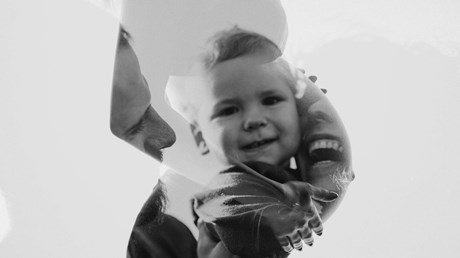 On April 8, the Vatican issued Dignitas Infinita, a 20-page document rejecting a variety of practices that violate human dignity. Unsurprisingly, these included human trafficking, violence against women, abortion, euthanasia, sex change, and child abuse. It also included surrogacy.This isn’t the first time the pontificate has come out against this “deplorable” practice, which “fails to respect the dignity of [the] child” and “violates the dignity of the woman.” Pope Francis made waves in January when he condemned surrogacy, noting that “a child is always a gift and never the basis of a commercial contract.”Evangelical Christians and pastors value the life of the unborn. That’s why we march across the capital on freezing January mornings and pray outside of abortion clinics. Our motivation for child protection must also lead us to confront the ways children are impacted by the baby-making industry as well.But when did you last hear your pastor address the issue of surrogacy from the pulpit? Odds are, never. Protestants have a dearth of official guidance on reproductive technologies. While some are clear on abortion, very few denominations have clear teachings on IVF, let alone the much rarer practice of surrogacy.Southern Baptist Theological Seminary ethics professor Andrew T. Walker told The New York Times that when he suggested introducing a resolution about artificial reproductive technology at the denomination’s annual convention, his colleagues hesitated.Some Christians are directly involved in surrogacy and see their role as a calling to help families have children, as CT reported in 2018. But many Christian bioethicists cite ...Continue reading... On April 8, the Vatican issued Dignitas Infinita, a 20-page document rejecting a variety of practices that violate human dignity. Unsurprisingly, these included human trafficking, violence against women, abortion, euthanasia, sex change, and child abuse. It also included surrogacy.This isn’t the first time the pontificate has come out against this “deplorable” practice, which “fails to respect the dignity of [the] child” and “violates the dignity of the woman.” Pope Francis made waves in January when he condemned surrogacy, noting that “a child is always a gift and never the basis of a commercial contract.”Evangelical Christians and pastors value the life of the unborn. That’s why we march across the capital on freezing January mornings and pray outside of abortion clinics. Our motivation for child protection must also lead us to confront the ways children are impacted by the baby-making industry as well.But when did you last hear your pastor address the issue of surrogacy from the pulpit? Odds are, never. Protestants have a dearth of official guidance on reproductive technologies. While some are clear on abortion, very few denominations have clear teachings on IVF, let alone the much rarer practice of surrogacy.Southern Baptist Theological Seminary ethics professor Andrew T. Walker told The New York Times that when he suggested introducing a resolution about artificial reproductive technology at the denomination’s annual convention, his colleagues hesitated.Some Christians are directly involved in surrogacy and see their role as a calling to help families have children, as CT reported in 2018. But many Christian bioethicists cite ...Continue reading... |



 Links
Links  Articles
Articles  Blogs
Blogs  Videos
Videos  News
News  Colors
Colors 

 New links
New links

